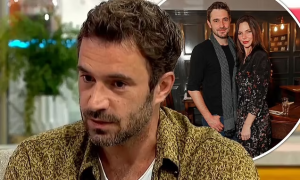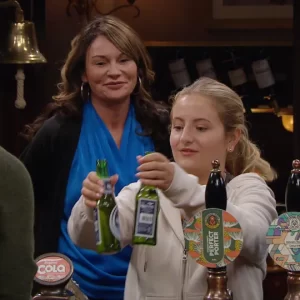Emmerdale star Oliver Farnworth gave a heartfelt update on his partner and EastEnders actress Samantha Womack‘s breast cancer journey, during an appearance on Lorraine on Thursday.
The former soap star, 51, revealed she was free of breast cancer in December 2022, five months after her diagnosis.
At the time she was having radiotherapy ‘to try and nuke any leftover cells’ and was having ‘ongoing treatment ‘as a prevention’.
Now, her actor boyfriend Oliver, 41, has revealed she is doing ‘incredibly well,’ and said he is ‘in awe’ of her ‘strength and determination’.
Chatting with Christine Lampard on the ITV morning show, the soap star blew a kiss to his partner through the screen and said: ‘She’s doing incredibly well. I’ve got to say a massive shout out to her and lots of love.

Emmerdale star Oliver Farnworth gave a heartfelt update on his partner and EastEnders actress Samantha Womack ‘s breast cancer journey, during an appearance on Lorraine on Thursday
The former soap star, 51, revealed she was free of breast cancer in December 2022, five months after her diagnosis (the couple pictured above in 2019)
‘She’s just been so strong and determined through it. I mean I was just thinking, when she got her diagnosis she didn’t have any symptoms, it was a routine check up and she just kind of felt something but she couldn’t feel anything physically.
‘We were very lucky because they detected quite a high grade of cancer and we were able to deal with that quite quickly.’
Opening up about her treatment, he added: ‘But she then went through the chemo and the radio, and it was her final radio sessions and she was determined to finish the show she was in at the time – The Lion, The Witch And The Wardrobe.
‘And that coincided with us moving to Spain. So she was having radiotherapy, moving house, and doing a West End show – and just dealt with it bravely and strongly with so much dignity and just determination. I was in awe of her.’
Oliver and Christine ended the segment by raising awareness and urging women to keep an eye out for abnormalities in their breasts.
The TV presenter remarked: ‘A tough time, but like you say she was built to in some way try to cope with it because she had a lot on at that time.
‘It’s why our Change And Check campaign, which started here on this show a few years ago, is just so important to continue to talk about it. I know Samantha will feel very passionately about that.’
Oliver finished the interview by pleading: ‘If you get a message for a routine mammogram or anything like that – just go.’
Chatting with Christine Lampard on the ITV morning show, the soap star blew a kiss to his partner through the screen and gushed: ‘She’s doing incredibly well’
Oliver said: ‘We were very lucky because they detected quite a high grade of cancer and we were able to deal with that quite quickly’
Oliver and Samantha began dating in 2019, the year after Samantha split from fellow actor Mark Womack, 63, – who she was with for 19 years and share two grown-up children.
Discussing her health in December 2022, Samantha told OK! Magazine: ‘Now I’m just having some treatment as I go back to work, as a prevention… We’re feeling a lot better than we were.
‘My treatment is ongoing for breast cancer. The surgery was quite difficult to recover from just because it’s quite tender when you have lymph nodes removed. There’s a few mobility issues at the beginning.’
She recalled: ‘The first round of chemotherapy was pretty hardcore really, it was quite toxic,’ before adding: ‘I’ve got radiotherapy for a bit of time to try and nuke any leftover cells.’
In November 2022, Samantha revealed her breast cancer was found during a ‘random check’ and said the disease had ‘attacked’ her ‘femininity’.
Speaking on This Morning, Samantha said she didn’t find a lump when she was diagnosed four months prior, saying her cancer was discovered in a random check.
‘It was really incredible because I didn’t find a lump, I didn’t feel unwell,’ she explained.
‘There had been a lot of illness around our friends and family and I just thought I’d get a random check and I had an ultrasound, and it showed a little shadow – at that point it could be anything, a cyst… then I had further investigations and then that diagnosis.’
Samantha and Oliver began dating in 2019, the year after Samantha split from fellow actor Mark Womack, 63, – who she was with for 19 years and share two grown-up children
In November 2022, Samantha revealed her breast cancer was found during a ‘random check’ and said the disease had ‘attacked’ her ‘femininity’
Samantha Womack speaks for first time since overcoming cancer
Samantha described herself as ‘very lucky’ because the lump was less than 2cm and she was able to have a lumpectomy to have the piece of tissue and five lymph nodes removed.
She went on to describe breast cancer as a disease which ‘attacks’ your ‘body’ and your ‘femininity’ as she urged other women to get checked.
She said: ‘Breast cancer is a strange one, it attacks your body and your femininity, your hair, your breasts, all these beautiful women of all ages.
‘So many women should be checking themselves in their thirties. That is an important message to get out and checked as well.’
She also described battling cancer as ‘terrifying’ but praised the treatments that are available now to treat the disease.
Breast cancer is one of the most common cancers in the world and affects more than two MILLION women a year
Breast cancer is one of the most common cancers in the world. Each year in the UK there are more than 55,000 new cases, and the disease claims the lives of 11,500 women. In the US, it strikes 266,000 each year and kills 40,000. But what causes it and how can it be treated?
What is breast cancer?
It comes from a cancerous cell which develops in the lining of a duct or lobule in one of the breasts.
When the breast cancer has spread into surrounding tissue it is called ‘invasive’. Some people are diagnosed with ‘carcinoma in situ’, where no cancer cells have grown beyond the duct or lobule.
Most cases develop in those over the age of 50 but younger women are sometimes affected. Breast cancer can develop in men, though this is rare.
Staging indicates how big the cancer is and whether it has spread. Stage 1 is the earliest stage and stage 4 means the cancer has spread to another part of the body.
The cancerous cells are graded from low, which means a slow growth, to high, which is fast-growing. High-grade cancers are more likely to come back after they have first been treated.
What causes breast cancer?
A cancerous tumour starts from one abnormal cell. The exact reason why a cell becomes cancerous is unclear. It is thought that something damages or alters certain genes in the cell. This makes the cell abnormal and multiply ‘out of control’.
Although breast cancer can develop for no apparent reason, there are some risk factors that can increase the chance, such as genetics.
What are the symptoms of breast cancer?
The usual first symptom is a painless lump in the breast, although most are not cancerous and are fluid filled cysts, which are benign.
The first place that breast cancer usually spreads to is the lymph nodes in the armpit. If this occurs you will develop a swelling or lump in an armpit.
How is breast cancer diagnosed?
- Initial assessment: A doctor examines the breasts and armpits. They may do tests such as a mammography, a special x-ray of the breast tissue which can indicate the possibility of tumours.
- Biopsy: A biopsy is when a small sample of tissue is removed from a part of the body. The sample is then examined under a microscope to look for abnormal cells. The sample can confirm or rule out cancer.
If you are confirmed to have breast cancer, further tests may be needed to assess if it has spread. For example, blood tests, an ultrasound scan of the liver or a chest X-ray.
How is breast cancer treated?
Treatment options which may be considered include surgery, chemotherapy, radiotherapy and hormone treatment. Often a combination of two or more of these treatments are used.
- Surgery: Breast-conserving surgery or the removal of the affected breast depending on the size of the tumour.
- Radiotherapy: A treatment which uses high energy beams of radiation focused on cancerous tissue. This kills cancer cells, or stops them from multiplying. It is mainly used in addition to surgery.
- Chemotherapy: A treatment of cancer by using anti-cancer drugs which kill cancer cells, or stop them from multiplying.
- Hormone treatments: Some types of breast cancer are affected by the ‘female’ hormone oestrogen, which can stimulate the cancer cells to divide and multiply. Treatments which reduce the level of these hormones, or prevent them from working, are commonly used in people with breast cancer.
How successful is treatment?
The outlook is best in those who are diagnosed when the cancer is still small, and has not spread. Surgical removal of a tumour in an early stage may then give a good chance of cure.
The routine mammography offered to women between the ages of 50 and 70 means more breast cancers are being diagnosed and treated at an early stage.





